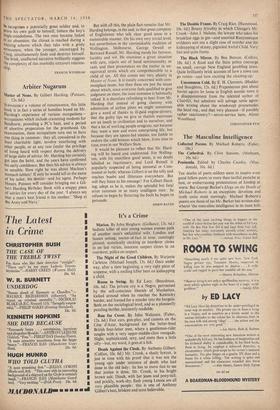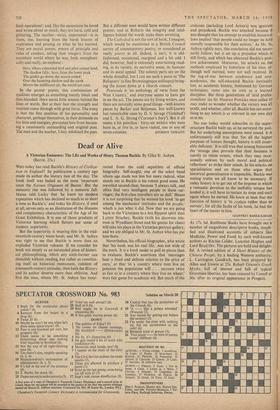The Masculine Intelligence
Peninsula. Edited by Charles Causley. (Mac- donald, 10s. 6d.) THE deaths of poets seldom seem to inspire even good fellow-poets to more than tactful pastiche at best, or embarrassing protestations of kinship at worst. But George Barker's Elegy on the Death of Michael Roberts is an exception; devotion and truth unite most movingly. Michael Roberts's poems are those of (as Mr. Barker has written else- where) 'the masculine intelligence in its most bril-
liant operations'; and, like the mountains he loved and wrote about so much, they are hard, cold and glittering. The teacher-strict, impersonal-is in them, too, learning from the harsh lessons of experience and passing on what he has learned. They are moral poems, poems of principle and rules of conduct, taking their imagery from the mountain world where he was, both metaphori- cally and really, an explorer :
Here, where exhausted bird and pilot cannot land, The shadow falls : here, from the lower peak The guides go down, the season ended; Over the haunting shadow and the earth Moves the indifferent air, the world not ours.
In the poorer poems, this combination of qualities emerges as something merely bleak and thin-blooded; there seems little tension behind the lines or words. But at their best the strength and stoicism come through with great force. The irony is that the fine qualities of his personality and character, perhaps themselves, in their demands on his time and energies, prevented him from becom- ing a consistently outstanding and original poet. The man and the teacher, I feel, inhibited the poet. But a different man would have written different poems; and in Roberts the integrity and intel- ligence behind the words make them arresting.
The Cathedral is not the sort of book, I imagine, which would be mentioned in a British Council survey of contemporary poetry, or considered as really poetry at all. Indeed, it isn't; it is old- fashioned, occasional, marginal and a bit odd. I did, however, find it extremely entertaining read- ing, in its variety, its narrative sense, its humour and its aural appeal. The solemn parts are on the whole dreadful, but I can see such a piece as The Reliquary' (a fine Browningesque soliloquy) bring- ing the house down at a church concert.
Peninsula is 'an anthology of verse from the West Country,' and everyone seems to have got in on the act. The poems are by living writers, and there are naturally some good things-well-known pieces by Barker and Betjeman, less well-known but remarkable ones by D. S. Savage (`Galahad) and L. A. G. Strong (`Coroner's Jury'). But it all seems a bit pointless : forty-six writers who were born in, or live in, or have visited, one or any of



































 Previous page
Previous page